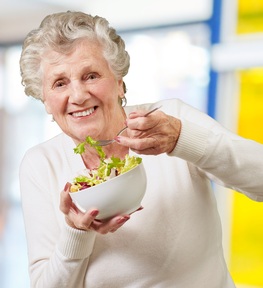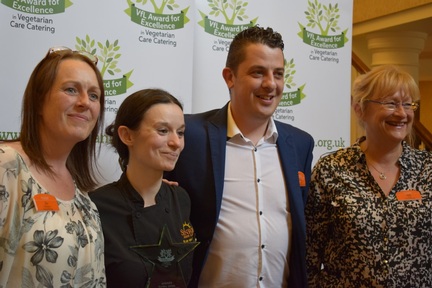Charity raises concerns care homes are feeding meat to vegetarians with dementia
A charity has raised concerns that when care home residents lose their mental capacity and ability to express themselves, some care homes are failing to respect their beliefs and are feeding them meat.

There are currently over 6,500 vegetarians and vegans living in care homes in the UK.
Vegetarian for Life was set up back in 2007 by trustees shocked by the story of an elderly woman who had been an animal’s rights campaigner and was vegetarian.
When she went into a care home after developing dementia, she was given food containing meat, with staff claiming they felt it was acceptable because she ‘would not know any different’.
In a similar case, three years ago, the daughter of an elderly woman with dementia at a care home in Wales, took her complaint to the Public Services Ombudsman for Wales, after finding she was regularly fed meat despite being vegetarian.
'Sadly this is a common approach'
Amanda Woodvine, director of Vegetarian for Life, which aims to improve the lives of older vegetarians and vegans and prevent this happening within the social care sector, said: “Sadly this is quite a common approach. But all individuals have a right to varied and nutritious meals, and respect for their previously held beliefs and cultural norms.”
As well as it being a total lack of respect for the person’s beliefs and way of life, eating meat after years of being vegetarian can really mess with a person’s digestive system as meat is harder for older people to digest, and even more so if they are not used to it.
Catering for vegetarians and vegans in care homes can be patchy, with some care providers offering a range of interesting, nutritious meals and others giving residents a rotation of cheese and egg dishes.
The risk of getting dementia is heightened if older people don’t have access to balanced, nutritious food. Its development can also be slowed down by good nutrition so it is vital care homes do their utmost to get it right.
'New award for vegetarian care catering'
In a bid to spread awareness and encourage more care homes to offer a menu of varied vegetarian and vegan dishes, Vegetarian for Life has set up a new annual award for excellence in vegetarian care catering.
Mike Ashbridge, director (Wales) for Vegetarian for Life (VfL) explained: “We set up the awards for two reasons; firstly, so we could draw attention to the fact there are many vegetarians and vegans living in care homes and secondly, to highlight just how good catering for vegetarians and vegans can be.
“Entrants to the competition write a submission on how they provide vegetarian food in the home and they also have to show a four week plan of different vegetarian and vegan dishes.”
This year’s award winner was Annika James, the dining services coordinator at Sunrise Senior Living of Tettenhall in Wolverhampton, who said she was “appreciative and honoured” to receive the award.

Diane Moreton, chair of Vegetarian for Life, revealed that Annika James “impressed the judging panel with a varied and interesting set of menus, and a real commitment to providing tasty and well thought-out vegetarian meals for Sunrise's residents. Attention is being paid to nutritional needs as well as appetising presentation.”
VfL has a list of 975 care homes on its website that offer vegetarian food. “These care homes have to make a commitment to abide by certain standards. The list is steadily increasing and we have had some groups join which is good. Organisations on our list are able to take advantage of subsidised catering courses which help develop their vegetarian and vegan cooking skills,” said Mr Ashbridge.
Vegan Rescue Pack
VfL also recently published The Vegan Rescue Pack, a free guide designed to support, encourage and empower those who cater for older vegans. This includes chefs working in the care sector, home care workers, or someone looking after an older member of their family.
The guide covers basic facts about the vegan diet as well as a range of easy-to-prepare recipes, and a 4-week menu planner.
For a free copy of the guide, visit http://vegetarianforlife.org.uk/resources/publications.
Predicted rise in vegetarians and vegans
VfL predicts the number of vegetarians and vegans coming into care homes will rise as this way of life became more mainstream and fashionable during the 1960s and 1970s. Also as Britain becomes increasingly diverse with different cultures, we will see more people entering care homes where being vegetarian is a key part of their religion.
Studies have also revealed that there has been a growth in recent years in the number of people aged between 55 and 65 becoming vegetarian, with older people reducing their meat consumption for health risks as well as to save money and for ethical reasons.
Mr Ashbridge echoes Ms Woodvine’s worry over care homes giving vegetarian residents meat products, saying “care homes do try and respect people’s beliefs. But there are concerns that when people start to lose their mental capacity and ability to express themselves that there is a chance their vegetarian diet could be compromised”.
He recommends that people going into a care home make sure they fill in an advanced care plan to ensure their chosen diet is respected and not compromised.
He added: “We want to help and support the care sector. The average age of someone in a care home is 85 so if they have committed to being a vegetarian most of their life, it obviously means a lot to them so care homes need to do their utmost to cater to their needs and beliefs.”
For more information on VfL go to www.vegetarianforlife.org.uk
Latest Features News
 25-Nov-19
2019 Election: Boris Johnson leaves social care in 'too difficult box' but Labour vows to end 'crisis'
25-Nov-19
2019 Election: Boris Johnson leaves social care in 'too difficult box' but Labour vows to end 'crisis'
 18-Oct-19
Podcast: Wendy Mitchell and dementia: 'My biggest fear is not knowing who my daughters are'
18-Oct-19
Podcast: Wendy Mitchell and dementia: 'My biggest fear is not knowing who my daughters are'
 27-Sep-19
Exclusive: Care minister backs care workers' call for time off to grieve and attend funerals
27-Sep-19
Exclusive: Care minister backs care workers' call for time off to grieve and attend funerals
 19-Sep-19
Podcast: Gyles Brandreth says poetry helps ward off dementia
19-Sep-19
Podcast: Gyles Brandreth says poetry helps ward off dementia
 30-Aug-19
Edinburgh Fringe funnyman joins comics facing toughest audience at care home gig
30-Aug-19
Edinburgh Fringe funnyman joins comics facing toughest audience at care home gig